- Home
- Nichole Christoff
The Kill List Page 20
The Kill List Read online
Page 20
“Could be.”
“You’ve got the list of names I texted you. Names of the people who complained to Tim and names of the people who threatened him. If any of them are retired military, if Tim changed their kid’s assignment, and if they have access to the post—”
“Those are a lot of ifs,” Barrett interrupted, “and I’m not going to sort them out for you.”
“Pardon?”
He glared at the roadway instead of at me. “Rushing up to Webster’s Trench to stare down Annie’s rifle barrel and then flicking on the lights when we reached the Pines? I know what will happen if I tell you who has access to my post. You’ll run right out and confront them. So I’m cutting you off. I’m not going to supply you with any information I uncover. I’m going to do my job and I’m going to coordinate with the FBI so they can do theirs.”
“All right,” I began. “I’ll research that list on my own, and—”
Barrett shook his head. “You won’t get past the Privacy Act of 1974.”
Unfortunately, Barrett might’ve been right about that.
The Privacy Act ensured that just because a soldier’s private information might pop up on a government document, John Q. Public couldn’t access that private information for the sake of his own curiosity. Mr. and Mrs. America could request government records through the Freedom of Information Act. But the Privacy Act guaranteed they wouldn’t be privy to a soldier’s personal details.
So PI license or no, as an average citizen I couldn’t stick my nose in a retiree’s private details. I could guess if he or she came and went on Fort Leeds. But I wouldn’t get to know for sure. Unless I knew someone who could get around the Privacy Act. And, as it just so happened, I did.
First, though, I had to take care of matters at the Pines. With Barrett beside me, I got a good look at the disaster zone. Between Matty’s room and mine, I found shattered mirrors, smashed TVs, and busted furniture. Most of our personal effects were untouched, miraculously. Sure, my toiletries were scattered across the bathroom as if swept from the countertop, but the clothes nestled in my suitcases were untouched, making this a rush job if I’d ever seen one.
Maximum impact.
Minimum amount of time.
Still, the effect was the same. I wanted out of the hotel. And I wanted Matty out, too.
He packed in a hurry while I changed, strapped on my weapons. I met with the manager to discuss the damages to the room. That done, I returned to my room under Barrett’s watchful eye.
“Get your things together,” he said. “I’ll call billeting, get you into the VOQ.”
I, however, had somewhere else I needed to be—with an old soldier who could get around the Privacy Act of 1974. I’d find out if anyone sending Tim death threats had the privilege of waltzing onto Fort Leeds to take potshots at him for changing a soldier’s assignment. And I’d try to learn if that person had a link to Kev or Charles Chapman Brown.
So I thanked Barrett for his offer.
“But,” I told him, “I’ve got to go to Washington.”
—
It was nearly noon by the time I got my rental car pointed south.
I made good time. Within a couple of hours of leaving Leeds, New Jersey, I pulled into the narrow alley that ran behind my townhouse in the Old Town district of Alexandria, Virginia. Built in 1803, the house had had more than a few upgrades over the centuries. When I’d bought it after my divorce, I’d made sure the security system was one of them.
Under the glassy gaze of my own surveillance camera, I reached from my car window, keyed my six-digit PIN into the panel outside my garage door. When the door rolled up, I drove inside. Only once I’d determined the door was down and I was alone did I unlock my car and get out.
Inside, I deactivated the house alarm, reset it, and activated it again.
God, it felt good to be home.
My footsteps echoed on heartwood plank floors, or were swallowed up by Aubusson carpets, as I walked from room to room, admiring the French sketches I’d picked up for a song at a rummage sale, touching the pewter candlesticks my mother’s great-great-great grandmother had cradled in her lap on the Mayflower, listening to the grandfather clock I’d had shipped from England.
Such were the feathers lining my empty nest.
But it was my nest and I found comfort in it.
Upstairs, I took the longest shower known to man. I climbed beneath the covers of my antique four-poster bed, figuring a nap would do me good. I’d been up the night before, and most of the night before that. From experience, I knew I’d need to be bright-eyed and bushy-tailed when I went to see the one man I needed to see.
In the early evening, I rose, dressed carefully, and drove the rental car to nearby Capitol Hill. Due to the hour, I found parking easily enough. And I found my father in his office, still at work.
Marta, his assistant, showed me into his chambers. He sat in a leather wingback chair by the fireplace. A merry fire crackled in its grate. Architect Charles Bulfinch had restored it after the War of 1812. And before the American Civil War, Daniel Webster had toasted bread and cheese each evening on its hearth.
Across the room, my father’s polished mahogany desk was the size of a small Caribbean island. It had been cleared for the night. But all over the coffee table at his side, reams of paper indicated he was working on his latest bill to go before the legislature.
“Jamie.”
My father rose to his feet. He was a handsome man and he always had been. Tall and broad, he’d been a linebacker at West Point. Now he resembled a mature Clark Kent. The temples of his perfectly cut dark hair had only recently been touched with white. And his eyes, so like mine, were still the color of thunderclouds.
He didn’t offer to hug me. He didn’t brush my cheek with anything that would pass for a kiss. He said, “This is a surprise.”
“A good one, sir?”
“Of course.” He waved me toward a tufted red leather sofa. I took a seat in the middle of it, folded my hands primly in my lap. “I did think you were in New Jersey, though.”
“I was. I just drove down.”
My father halted before the eighteenth-century English sideboard that served as his liquor cabinet. “You’re going back, aren’t you? Tim needs your help. You know how I view quitting and you know how I view failure.”
My father’s reproof sparked an itch beneath my sternum. And his championing Tim squeezed my heart. But it had always been like that.
“I’m not here because I failed, sir.”
“Good.” My father’s curt nod bestowed approval.
His hand hovered over the cut-crystal decanters arranged along the sideboard. I declined the implied offer. He helped himself to a double pour of single-malt scotch. Then he resumed his seat in the wingback chair.
My father sipped the liquid from his glass, savored it, and swallowed. “Why are you here, then?”
“To request your help, sir.”
I told him what I wanted to know. About the authors of the death threats sent to Tim’s office. About the complaints that soldiers had died when others had been reassigned stateside.
“And you believe Tim signed off on these changes of assignment?”
“Yes, sir.”
That revelation didn’t sit well with him. But my father hadn’t risen to the rank of major general, or won a seat in the U.S. Senate, by closing his eyes to the shortcomings of men. He only closed his eyes to his own.
He crossed to his desk and paged Marta. He told her what I wanted. That done, he said, “I’m having a late supper at the club tonight. Why don’t you join me?”
He probably meant the invitation or he wouldn’t have issued it. Still, I came up with some excuse. Because after seeing my father, discussing my ex-husband, and knowing his daughter was still lost in the world, I didn’t feel much like eating.
Chapter 29
I picked up what I liked to call chocolate consolation. My favorite Chinese restaurant made the best chocolate cake
—and it was always good for what ailed me. At home, I ate a thick piece of it, drank my dinner from a vodka bottle, and tried to stop thinking for a few hours. I couldn’t stop thinking of Kev, though. Betraying his wife was bad, but he hadn’t deserved to be broken by Charles Chapman Brown. I phoned the nurses’ station on his floor. His vitals were weak, but he was doing as well as could be expected.
I couldn’t stop thinking about Barrett, either. He was cool under fire and hot in a towel, and I tried to tell myself our interest in each other was merely physical. But I didn’t believe that for an instant. Barrett worried about me when I was away and when he was near, he made me feel as though my failings didn’t matter. I didn’t call him, however, and he didn’t call me.
As the sun rose, I decided one night in the familiarity of my own home had not been enough—but one night was all I could afford to take.
A quick call to Frank yielded no news about Brown. A long chat with Marianne Lewis convinced me she and her kids were still safe. The morning news shows aired fresh video of Brooke. Performing at her first dance recital, Brooke was impossibly cute in pink tulle. And unmistakably proud as she pirouetted on chubby little legs.
Then the talking head on the TV ruined the moment by asking, “Is Baby Brooke alive or dead?”
I threw a shoe at the screen.
As I packed a bag for my return trip to Fort Leeds, my doorbell rang. I checked the video monitor linked to the camera system outside the house and saw Matty standing on my doorstep. He carried a dull silver case in his hand.
Over orange juice and coffee cake, he tried to talk me into letting him come back to Jersey with me. I wouldn’t budge. Resigned, he offered me the silver case.
“What’s this?” I laid the thing on the granite breakfast bar between us, unsnapped the locks, and lifted the lid. Inside was a receiver. A small, handheld thing.
Matty removed it from the case’s foam lining and powered it up. An LCD screen lit with a street map. “It’s a GPS monitor. The Feebs’ve probably trashed our bugs by now. But unless Thorp or his wife found out about the tracker on their vehicle, it’s still operational.”
My heart leapt. “You tagged Tim’s BMW?”
“No. The night you bugged Thorp’s house, all those MPs were everywhere, remember?”
I did.
“They could see the Beemer in the driveway, but they couldn’t see me sneaking the tracker out of your car. They couldn’t see me in Thorp’s carport, either, so I tagged the Jeep parked there.”
Brandy’s Jeep. Not that tracking Brandy would do me any good. But still, I smiled at Matty.
He was a good soldier.
And Marta was a good senator’s secretary.
She called just as I hit the Capital Beltway. She hadn’t yet uncovered all the information my father had asked her to dig up, but she did have one thing. After she emailed her findings to my BlackBerry, I pulled over at Shirlington Village to open the file.
It was a list of soldiers who’d originally been assigned to head overseas. And details of their last-minute assignments to other units, courtesy of Tim. One of the soldiers, Austen Andrew Bradley the Third, had been assigned to nearby Fort Myer.
Needless to say, this was something of a surprise. Fort Myer is home to Arlington National Cemetery, the Tomb of the Unknown Soldier, and the soldiers who honor the country’s fallen with the precise pageantry of military funerals: E Company of the Third U.S. Infantry, the Old Guard. Assignments to the Old Guard are coveted. And difficult to come by.
Somehow, though, Bradley had gone from facing his first deployment to Iraq to an assignment serving Arlington.
I wanted to know why.
I debated calling the young man’s parents. Daddy was a banker in Manhattan. Mother volunteered for upscale charities in Connecticut. Neither, I knew, would tell me what I needed to know. So I started up my rented Taurus and pointed it toward Arlington.
Twenty minutes later, I was wandering the wide corridors of the stables of Fort Myer. Here, under the archways of brick buildings erected in the 1930s, lived the horses that drew the caissons through Arlington National Cemetery, escorting the dead to their final resting place. Many of the horses whickered as I passed, flicking curious ears my way. I thought of all the grief they must see in the course of the day, wondered how it impacted them. And I passed my share of empty stalls, too, indicating some were at work, serving the grief-stricken at this very moment.
Thanks to directions from a handsome pair of soldiers in Old Guard blue, I found Austen Andrew Bradley in one of those empty stalls.
He was mucking it out.
“Excuse me, Specialist Bradley?”
He jerked to attention, a force of habit, then relaxed, leaning a little on his pitchfork. “Yes, ma’am?”
“I’m Jamie Sinclair. I’d like to ask you some questions.”
He didn’t like the sound of that. Resentment flared in his eyes. “About what, ma’am?”
“About your assignment here, your assignment to Fort Leeds, and the one you didn’t have to Iraq.”
He stared at me a moment. Then he said, “They got caught, didn’t they?”
“Who got caught?”
“My parents.”
“Not exactly,” I told him. “But why don’t you tell me about them.”
Sitting on a stack of hay bales at the end of the line of stalls, Austen Bradley did.
“I shouldn’t be at Fort Myer. I know it.” He took a long pull on the bottle of water he’d dug out of his knapsack. “The Old Guard is for soldiers who earn it. My parents bought it. But you know that or you wouldn’t be talking to me.”
“I know a number of soldiers at Fort Leeds got last-minute reassignments. And some of the ones who took their places in Iraq died.”
“It figures. It just figures.” In a crackle of plastic, his hands fisted around his water bottle. “My parents, and people like them, have to get what they want. They don’t give a damn about what happens to anybody else.”
“What happened to you?”
Austen’s smile was a wicked thing. He had a good-looking face, happy and tan and free of the worry lines that would catch up with him in later years. “When I didn’t make the cut on the eighth-grade football team? New uniforms for everyone, and boom—I got to play. That rejection letter from Harvard? Clerical error. The new Bradley Center for International Studies was just a coincidence. Do you have any idea how hard it is to be taken seriously once people find out your parents do stuff like that?”
Having grown up as the daughter of a powerful father, I had a very good idea. Not that my father had ever been inclined to smooth the way for me. He’d held the view I had to be better, and I had to work harder, because I was his daughter, and he’d always made his view—and his will—very clear.
“Well,” I told Bradley, “the army didn’t reject you.”
Austen had been a good recruit. I’d seen his record, thanks to Marta. He’d met all the requirements, passed all the tests. His achievements weren’t stellar. But he was good.
Austen frowned. “My folks nearly had heart attacks when I signed up. When I broke the news to them, they tracked down my recruiter, tried to bribe him into letting me off the hook. But I wanted to enlist. I wanted to do this for my country. And for me.”
I smiled.
I wished there were more people in the world like Austen Andrew Bradley the Third.
“When I got assigned to Iraq, they really went nuts. My father came down to Fort Leeds personally, demanded to see all the brass he could scare up.”
“Including the commander? Colonel Tim Thorp?”
“I guess so. I didn’t ask. It’s not like he’d tell me anyway. Then the next thing I knew, I got reassigned here.”
This news helped and it didn’t. Austen couldn’t verify that his parents had made any kind of deal with Tim. But his folks had a pay-for-play history. Could that explain the rash of reassignments at Fort Leeds? And the cash in Tim’s safe?
“I lov
e the army,” Austen told me as I took my leave of him. “If I screw up, it’s on me. And when I do great, it’s still on me. Just me. This is the end of the road, though, isn’t it? Because of my parents.”
I looked into his face, so young, so wise, so disappointed. “Let’s hope not.”
But, I thought as I left the stables, it might be the end of the road for Colonel Tim Thorp.
—
When I slammed into Tim’s office two hours later, he jumped to attention like a recruit in basic training. He’d barricaded himself behind his desk with mountains of files. But I didn’t get a sense he was actually doing anything with them. No, he was here so he wouldn’t have to be at home with the FBI—and his worried wife. Derrick Larkin was with him, combing through a stack of the files as fast as his fingers would go. Pearce lounged in one of the visitor’s chairs.
All three men stared at me.
I could sense the FBI agents looming in the doorway behind me. They were the same ones who’d been here during my first visit with Barrett. I’d looked tame to them then, no doubt.
Well, their mistake.
“Sir,” one of them asked, “is everything all right here?”
“Everything’s fine,” Tim said. “Close the door on your way out.”
The agent didn’t move.
“I said close the damn door!”
So this was the way it was going to be. Tim would take the high ground. He’d stoop to command FBI agents and little ex-wives like me.
That was okay.
I was spoiling for a fight.
The agent wasn’t. He closed the door. I figured I had approximately four minutes before Barrett and a barrage of agents showed up in response to the phone call the guy was no doubt placing right now.
I said, “Tell me about the cash in your safe, Tim.”
“I don’t know what you’re—”
“Yes, you do. You handed me a wad of it for a retainer. Where did it come from?”
It was as if my words had turned Tim to ice. Then he said, “Pearce? Derrick? Could you give us a minute?”

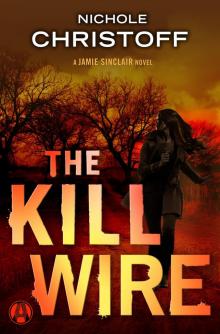 The Kill Wire
The Kill Wire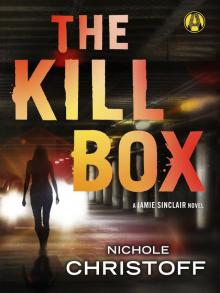 The Kill Box
The Kill Box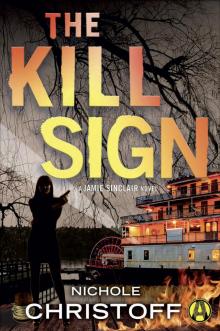 The Kill Radius
The Kill Radius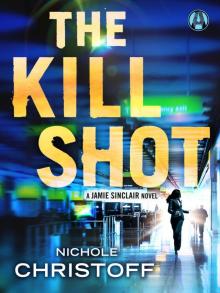 The Kill Shot
The Kill Shot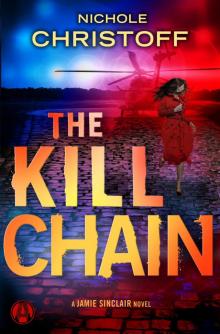 The Kill Chain
The Kill Chain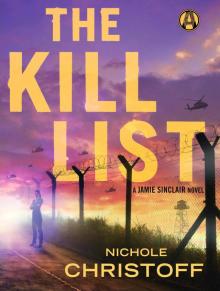 The Kill List
The Kill List